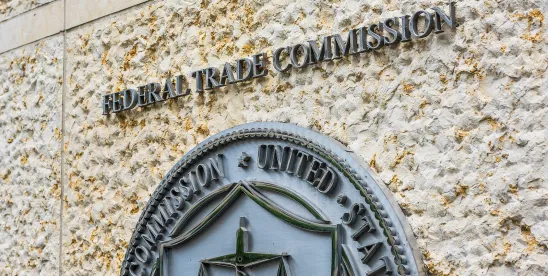On March 31, 2025, President Trump signed an executive order (EO 14254) titled “Combating Unfair Practices in the Live Entertainment Market.” EO 14254 directs the Federal Trade Commission (FTC) to, amongst other provisions, rigorously enforce the Better Online Ticket Sales Act (BOTS Act or the Act) and address unfair ticket scalping practices.
Overview of the BOTS Act
Enacted in 2016, the BOTS Act aims to prevent ticket brokers from buying large numbers of event tickets and reselling them at inflated prices. The Act applies to tickets for public concerts, theater performances, sporting events, and similar activities at venues that seat over 200 and prohibits an entity from circumventing access controls or security measures used by online ticket sellers (such as Ticketmaster) to enforce ticket-purchasing limits. It also prevents the resale of tickets obtained by knowingly circumventing access controls. Violations of the Act are considered violations of Section 5 of the FTC Act, which prohibits unfair or deceptive practices. Violators are subject to fines of up to $53,088 per violation.
Under the Act, the circumvention of access controls or security measures is construed broadly and applies to automated ticket bots and certain human actions. A ticket bot is a software program designed to rapidly purchase large quantities of tickets the moment they become available. Scalper bots specifically automate tasks like filling out forms, refreshing web pages, and completing the checkout process. Since scalper bots can complete the checkout process much faster than human users, they can buy thousands of limited-edition tickets as soon as they go on sale. Scalped tickets are then resold for higher profit because they are no longer available from the original ticket seller – this practice is known as ticket scalping.
Sellers often set limits on the number of tickets each buyer can purchase. Bots can bypass this limit by rapidly purchasing tickets across multiple accounts or using fake online profiles and IP addresses. Bots may bypass CAPTCHA and other security measures or manage multiple browser sessions simultaneously to purchase large volumes of tickets simultaneously. These tactics may run afoul of the BOTS Act if the seller has access controls or security measures to prevent such activity. The BOTS Act is not only limited to bot activity, though. A person who buys tickets by creating multiple accounts or using proxies and VPNs to disguise their IP address may also be circumventing a seller’s security measures, which may also violate the Act.
Enforcement Action Under the BOTS Act
In January 2021, the FTC filed complaints against three ticket brokers for allegedly using bots to buy tens of thousands of event tickets and then resell them at inflated prices. The FTC alleged that the defendants violated the Act in multiple ways, including using bots to search for and automatically reserve tickets, using software to conceal their IP addresses, and using bots to bypass CAPTCHA security measures. The complaint also alleged that the defendants had created hundreds of Ticketmaster accounts in the names of friends, family, and fictitious individuals and used hundreds of credit cards to bypass ticket limits. In total, the brokers were subject to a judgment of over $31 million, but due to their inability to pay, they were ultimately liable for $3.7 million in civil penalties.
The BOTS Act also empowers state attorneys general to enforce the Act if they determine that their states’ residents have been threatened or adversely affected by violations of the Act. Though there has been little notable state enforcement action to date, senators from both political parties have introduced bills to enable stronger enforcement of the Act. For instance, in May 2024, the Democratic governor of Arizona, Katie Hobbs, signed and passed a state law often referred to as the “Taylor Swift bill” to authorize the state’s attorney general to investigate unlawful uses of bots to purchase multiple event tickets or circumvent waiting periods and presale codes.
Looking Forward
The executive order instructs the FTC to “rigorously enforce” the BOTS Act and to provide state attorneys general and consumer protection officers with information and evidence to further this directive. The EO also directs the FTC to take additional actions, such as proposing regulations and enforcing against unfair methods of competition and unfair or deceptive acts and practices.
EO 14254 follows on the heels of a December 2024 FTC Rule – the Junk Fees Rule – banning junk ticket and hotel fees, which goes into effect on May 10, 2025. Under the Junk Fees Rule, businesses must clearly and conspicuously disclose the total price, including all mandatory fees, whenever they offer, display, or advertise any price of live-event tickets or short-term lodging. According to the FTC, the Junk Fees Rule enables the agency to “rigorously pursue” bait-and-switch pricing tactics, such as drip pricing and misleading fees.
Following the release of EO 14254 on April 8, 2025, two members of Congress, Diana Harshbarger (R-TN) and Troy Carter (D-LA) co-sponsored a bill in the House titled the “Mitigating Automated Internet Networks for [MAIN] Event Ticketing Act.” This bill is a companion bill to the one initially introduced in the Senate by Marsha Blackburn (R-TN) and Ben Ray Luján (D-NM). The bill would create reporting requirements for online ticket sellers to report successful bot attacks to the FTC. The proposed legislation would also create a complaint database for consumers to share their experiences with the FTC, who would, in turn, be required to share the information with state attorneys general. According to Congresswoman Harshbarger’s press release, the legislation aims to build on the BOTS Act and codify EO 14254. There is strong bipartisan support for live-event industry regulation. In light of EO 14254, the FTC’s Junk Fee Rule, and the MAIN Event Ticketing Act introduction, it is safe to say that both state and federal authorities are focused on regulating the live entertainment industry, particularly in the ticket sale context. BOTS Act enforcement may increase in the coming years, and ticket scalpers should beware.



 />i
/>i

